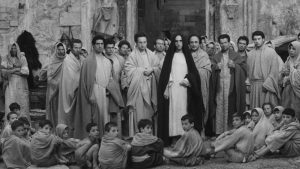Words on the Word
Palm Sunday
Isaiah 50.4-7: I offered my back to those who smote me.
Philippians 2.6-11: Put on the mind of Christ.
Mark 14.1-15.47: Let the Scriptures be fulfilled.
Holy Week is defined by a carefully ordered dramaturgy. Day by day we follow Jesus through the Gospel. On Monday we participate in the supper at Bethany. Lazarus, still dazed at having lived through death, is host while Mary anoints Jesus’s feet. On Tuesday we hear the Lord predict Peter’s betrayal: even apostolic courage has limits. On Wednesday we relive Judas’s negotiation with the high priests. Judas asks, ‘What will you give me if I hand him over to you?’ It is terrible! We can stoop low enough to attach a price tag to what we profess to love, to expect gain from grace. Then the Triduum begins, with the institution of the Eucharist on Maundy Thursday, the Crucifixion on Good Friday, the long wait of Holy Saturday, then the inflamed crescendo of the Easter Vigil, culminating in the proclamation that is the foundation of our faith: ‘He is risen!’
Within this framework Palm Sunday can seem like a disturbance. The first part of the Mass, our symbolic entry into the City of David, fits the chronological pattern. But why do we read the Passion today? Is that not a disruption?
In a way the question is out of place. Holy Week is no linear detective story. We know what happens, what will happen. In any case the liturgy regularly throws us back and forth in space and time. To live liturgically is to establish our perception of the real within a whole transcending boundaries. Even at Christmas, when angels sing above the Child in the manger, the words resound in the course of the Mass: ‘On the day before he was to suffer, he took bread in his holy and venerable hands.’
The Palm Sunday Passion has a further, more precise function, however. It reminds us of where we are, and of why we’re there. Through Lent we have sung, ‘Behold, we go up to Jerusalem!‘ We have heard it affirmed again and again that Jesus must accomplish his mission there: ‘It is impossible for a prophet to be killed outside of Jerusalem’ (Lk 13.33). He ‘has to’ go up to the city (16.22) not in spite of, but because of the fact that it ‘kills the prophets and stones those who are sent to it’ (Mt 23.37).
The Word became flesh not merely in order that God might walk synodally among us, not merely that we might hear his teaching and see our nature divinised. The Word became flesh to be offered ‘as a fragrant offering and sacrifice to God’ (Eph 5.2).
And Jerusalem is the place for sacrifice. Indeed, sacrifice preceded the place. We hear Jerusalem spoken of first in Genesis. It is there that Abram meets Melchizedek, the first-named priest of Scripture, who comes out to bless him, bearing bread and wine (14.18f.). Melchizedek is mentioned only one more time in the Old Testament, in a Psalm of David (Psalm 109); his greatness is revealed in the Letter to the Hebrews, which sees him as a type of Jesus, our High Priest. Melchizedek’s prophetic oblation is fulfilled in Jesus’s oblation of himself, ‘obedient unto death, death on a cross’ (Phil 2.8), that is, in the ineffable sacrifice of Calvary which, the day before he suffered, he pointed towards by means of mystic signs, again of wine and bread.
Jerusalem acquires its status as a holy city when an angel of God bids David build an altar of propitiation there. The altar was to stand on the threshing floor of Ornan the Jebusite (1 Chron 21.18).
The rebuilt temple of King Herod, which the apostles admired ahead of Jesus’s Pasch, exclaiming, ‘Master, see what stones, what buildings!’ (Mk 13.1), was the ornamental precinct round the altar at which God had ordained the reconciliation of mankind.
Jesus must go up to Jerusalem to take that altar’s place. The old covenant has completed its mission; the new covenant, drawn up in his Blood, is about to begin. For God, writes Paul, has made Jesus himself a vehicle of atonement. He is henceforth altar and sacrifice all in one (cf. Rom 3.25). His Body, into which, through the Church, we are incorporated, is the new, eternal Temple. It remains for us a source of freedom, forgiveness, and wisdom until the end of time (Eph 1.7).
When, on the eve of Good Friday, Jesus is indicted before the clerical court in Jerusalem, one accusation above all is to the fore. Spies declare: ‘This fellow said: I am able to destroy the temple of God and to build it in three days’ (Mt 26.61). What have you to say for yourself?, asks Caiaphas. ‘But Jesus was silent’ (Mt 26.62). What else could he have done? When he entered the world, ecstatically given, he cried out to his Father: ‘Sacrifices and offerings you have not desired, but a body you have prepared for me’ (Hear 10.5). This surrendered body represents our nature. At Easter, in Jerusalem, human nature itself is renewed.
By Christ’s sacrifice our sin is forgiven. We pass through death and are awakened to life without end. Christ’s high-priestly action makes us into ‘a royal priesthood, a holy people’ (1 Pet 2.9) called to sanctify the world by the grace we receive. It is in order to remind us what Easter is about that we are asked to meditate today, in anticipation, on the Passion narrative.
Let us be receptive to the message the Church communicates to us.
Let us say an unconditional Yes when she, our Mother, bids us, these days, stay close to Jesus.

Jesus with the children of Jerusalem in Pasolini’s The Gospel According to St Matthew – excellent video divina for Holy Week.
